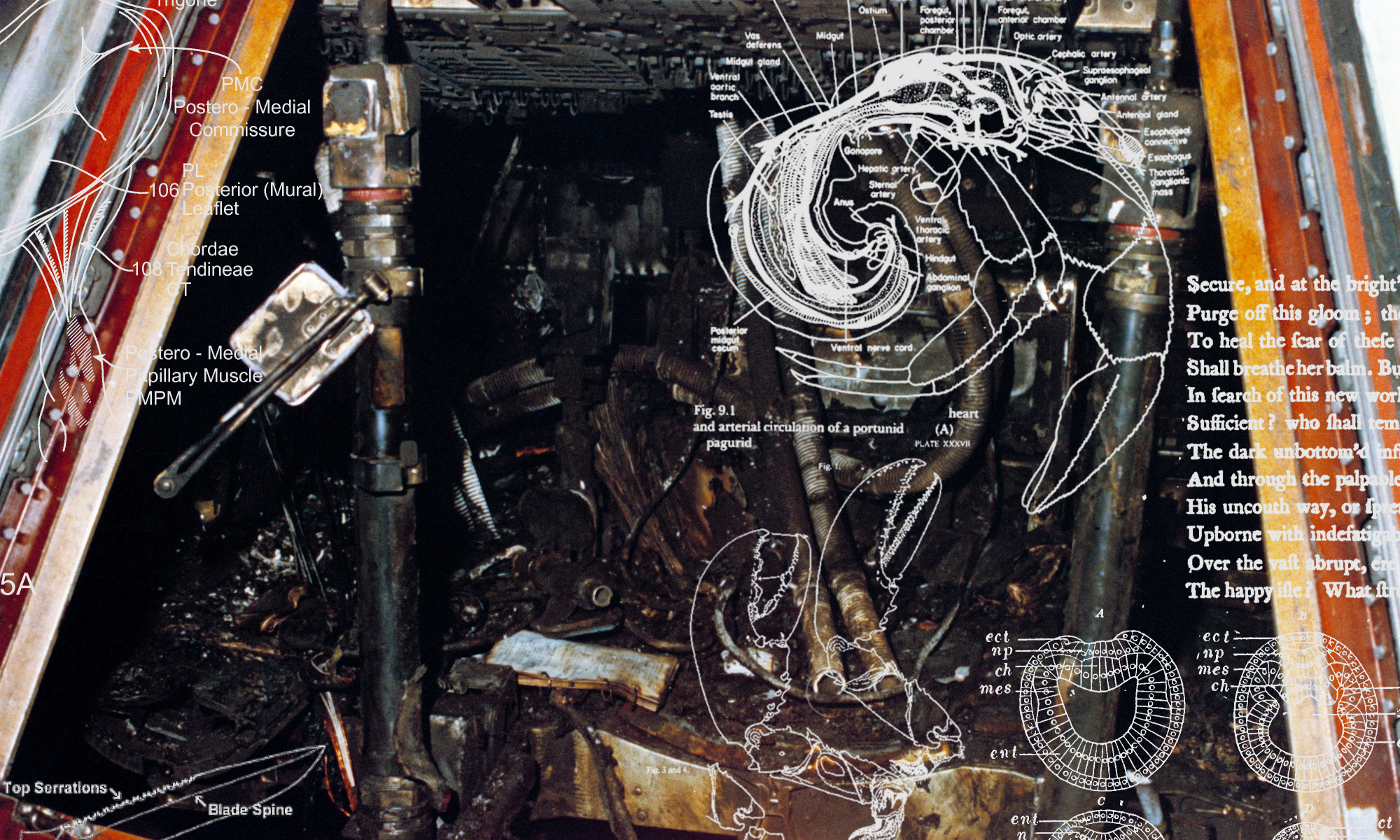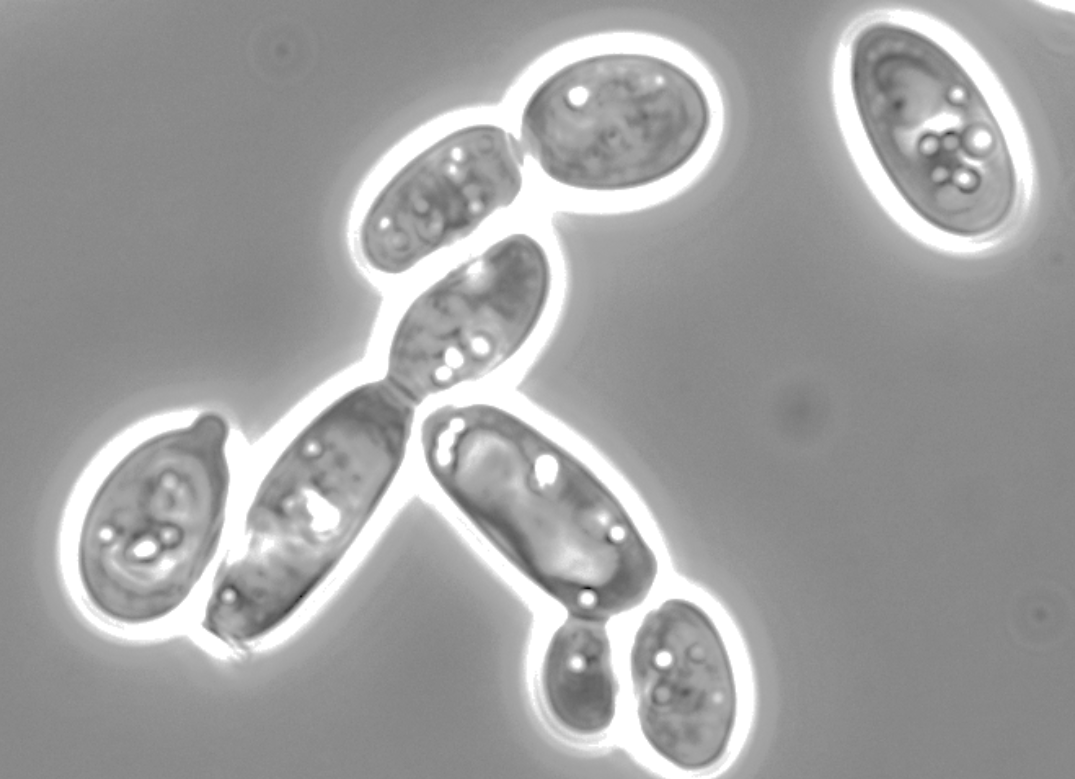Every morning in [location not found] is the same. Wracked coughing as the body realizes it has just spent another night intaking poisons. Sheets yellow with a thousand nights of accumulated sweat, but not worth wasting washing water on. The window is open to the heat of the veld and the gibbering xenocomm of population and city. Light filling the room like some horrible fluid, spilling over the windowsill and pooling onto the floor. Looking out over the buildings, so new and so harried they still bristle with rebar, seemingly leaning toward the Spine, thick with soft transit tubes hung from cables as it tumbles toward the coast. Sky to sea a sheet, nicotine colored, the true location of the horizon as good your guess as mine, a bleary latitudinal omphalos only discernible as a subtle desaturation. From the rim of the world civilian skimmers and Maersk behemoths alike issue in some secretive gnosis.
City of the Interstices (0:0)
Loop 0
反历史虚无主义的综合防御和时间复化科学发展领导小组
Expert memorandum for the Central Leading Group for Comprehensive Defence Against Historical Nihilism and Scientific Development of Temporal Complexification
Designated informational quarantine status: 9:3 (高度传染) (suspended)
Classification: vortical–contrapuntal
From the transcendent perspective of history, the city of Hong Kong appears as an abomination. Since the island’s annexation to the British Empire and the foundation of the City of Victoria in the 1840s, it has remained an anomaly, provoking, in varying degrees, contempt, impatience, and outrage among all those bureaucrats charged with its ultimate imperial oversight. From Charles Elliot, Hong Kong’s first, unmourned administrator — whose recompense for securing the isle was a letter from Lord Palmerston informing him that in taking this “barren Island with hardly a House upon it” he had “disobeyed and neglected [his] Instructions”, and would promptly be relieved of his post[note]Viscount Palmerston (Foreign Secretary) to Elliot, private letter of April 21, 1841. Palmerston goes on to note that “it seems obvious that Hong-Kong will not be a Mart of Trade”.[/note] — to CY Leung, whose handling of the present swelling vortex of cultural conflict lost him the Party Centre’s confidence and his office shortly thereafter, few of Hong Kong’s administrators have escaped some measure of opprobrium from their overseers across the sea, whichever sea that may be.
Even perhaps the earliest inkling of Hong Kong’s future material glory, a prophetic fragment attributed to the mendicant Song-era poet-alchemist Bai Yuchan, which appears to foretell, many centuries in advance, myriad ships crowding Hong Kong’s waters beneath a glittering night sky,[note]“長沙左手接青羅,右攬青衣濯碧波,深夜一潭星斗現,里頭容得萬船過.” The provenance of this verse is obscure; the sole reference in English, Michael Ingham, Hong Kong: A Cultural History (Oxford University Press, 2007), 1, does not relate the original Chinese and misattributes the verse to a “Bai-yu Shan”. In Chinese, see here.[/note] was amply repaid by Bai’s earlier unhappy attempt at a career as a bureaucrat — squandered, tellingly, due to his examiners’ censure of his youthful pride. That he subsequently attained immortality was presumably only insult to injury.[note]On the career of Bai Yuchan, see Li Wang, ‘A Daoist Way of Transcendence: Bai Yuchan’s Inner Alchemical Thought and Practice”, vol. 1 (PhD diss., University of Iowa, 2014), 26–86. Cf. also FYSK: Daoist Culture Centre — Database, “Bai Yuchan”.[/note]
Hong Kong is a space of negative sovereignty.[note]It is, of course, also a space of positive sovereignty; but any empire of the sea is at one and the same time poisoned by its land.[/note] From its beginnings it has been a site of autonomy defined not as the positive expression of liberty but as the modulated suspension of authority. This negativity, today, is embodied in its constitutional character as the ‘Hong Kong Special Autonomous Region’, a region shielded against the central institutions of the People’s Republic, defined by an intentional state of exception fixed teleologically on Eschaton 2047. The Basic Law that enshrines the condition of One Country, Two Systems is unequivocal: the fundamental basis of the self-government of this city is that “The socialist system and policies shall not be practised …” (Article 5).[note]Basic Law.[/note]
In the past, however, Hong Kong’s negativity was immanent to its colonial distance in space and time, sustained by an administration that remained serenely uninterested in the desires of its superiors in Whitehall. It shares this trait of negativity, at least in part, with the other great outpost of the Singlosphere, Singapore — perhaps the only country to have gained its independence against its will.[note]One of many hagiographies recounts the press conference in which Lee announced Singapore’s independence as follows: “[Lee] wept. He sat back in his chair, asking for a few minutes’ adjournment as he wiped away his tears.” Anthony Oei, Lee Kuan Yew: Blazing the Freedom Trail (Marshall Cavendish Editions, 2015).[/note] In Singapore, this occasion was commemorated by Edwin Thumboo, whose poem “9th of August — II” expresses his rage at the Malaysians, minds set against Lee Kuan Yew’s efforts to hold the federation together, whose
call became a prayer
In firm ancestral beckoning.
They kicked us out.[note]Quoted in Ee Tiang Hong, ed. Leong Liew Geok, Responsibility and Commitment: The Poetry of Edwin Thumboo (Singapore University Press, 1997), 34.[/note]
There is no such single traumatic instant of negative self-definition in Hong Kong — no inherited ancestral beckoning echoing and inverting in a developmentalist drive to national self-betterment.[note]Albeit that some Hongkongers now themselves take the British to task for kicking them out, unwilling to protect their rights — so they claim.[/note] Rather, Hong Kong’s negativity remains anchored historically in the attitude of its colonial administrators. These were men who circulated from the elite universities of Britain, often trained only in the Western and Chinese classics and with little or no experience in administration, with neither settler ties to the land they now governed nor effective responsibility to the imperial government they represented. And so they perched, for much of the year, on Victoria Peak — aloof from the growing native population that gathered below, partaking only in an insulated colonial high society.
Indeed, this sequestered colonial administration refused, from the beginning, to engage in the affairs of the native Chinese, allowing them to self-organise; they, in turn, lacking a scholarly bureaucracy inherited from imperial China, were left to promote merchants — rather a euphemistic term for a pirate and owner of brothels and casinos like Loo Aqui — to positions of leadership, renouncing the lowly status awarded them in Confucian evaluation. This laissez-faire attitude was no small source of consternation to successive imperial overseers — by 1941, the Hong Kong authorities were derided by an incoming reformist administrator for their “pig headed provincial[ism]”.[note]Namely David MacDougall (later Colonial Secretary, 1946–49). Steve Tsang, Governing Hong Kong: Administrative Officers from the Nineteenth Century to the Handover to China, 1862–1997 (I.B. Tauris, 2007), 49.[/note] Nonetheless, in varying degrees, this studied disinterest persisted — to the end of colonial rule, and beyond.
The most infamous manifestation of this disinterest has undoubtedly been Hong Kong’s economic policy. With the exception of its provision of public housing, a policy rooted in the Crown monopoly on the colony’s land (still maintained today by the SAR government), even at the height of the gathering Keynesian hegemony of the 1930s on, Hong Kong’s administrators stubbornly rejected both the advice of the increasingly decisive bulk of the economics profession and the dictates of their London superiors — pressure that reached a climax after the Labour victory following World War II. Making the most of its spatio-temporal isolation from the mother country, the colonial administration deployed every legislative response and tactic of prevarication at its disposal to prevent the encroachment of the new economics on its internal policy.
It is a mistake to ascribe this anomaly simply to voluntary choice or an ideological principle current among Hong Kong’s administrators. It was not merely that there was little appetite for Keynesianism among the colonial administrators, for instance. Decades of distance between a circulating imperial government and a fixed — or, more properly given the flux of migration that characterised mid-twentieth-century Hong Kong, counter-circulating — population, fortified by the government’s bloody-minded indifference, meant that the basic econometric infrastructure that would have enabled such interventionism in the first place simply did not exist. Elementary trade statistics; GDP figures; accounts of aggregate industrial production — none of these were collected until the 1970s: “the colonial administration had no reliable data by which to gauge economic performance” at all.[note]Leo Goodstadt, Profit, Politics, and Panics: Hong Kong’s Banks and the Making of a Miracle Economy, 1935–1985 (Hong Kong University Press, 2007), 71. This intriguing book, one of the most comprehensive recent summary treatments of Hong Kong’s meteoric economic development, reveals much more than its author — an avowed proponent of fiscal regulation whose thematic purpose is to demolish the image of competence of the colonial administration — would like.[/note]
By and large, those ambitious men who would implement such reforms were equally lacking. One searches in vain among Hong Kong’s policymakers for a visionary like Lee Kuan Yew: John Cowperthwaite, the man who has attracted occasional attention as a candidate for this status, merely helped justify a policy that had already been sustained for decades by his predecessors; promoted to Financial Secretary more out of convenience than specific merit — common practice for the classically educated Cadets who formed the top leadership of the colonial administration[note]Though Cowperthwaite did receive an accelerated one-year basic degree in economics, he had originally studied classics.[/note] — his knowledge of fiscal procedures was underwhelming, and under his intermittent supervision, “unsound” practices were allowed to flourish.[note]Relating that “administrative officers could not be relied on to comprehend even the most ordinary features of banking business”, Goodstadt adds that Cowperthwaite was particularly “ignorant and incompetent”, repeatedly making misjudgements on the soundness of banks’ finances, and lacking elementary knowledge on matters such as the accounting of bank deposits. Goodstadt, 28, 3. Of course, the ultimate results of this “ignorance and incompetence” speak for themselves.[/note] Though for the native population real power often resided elsewhere — in temples, local committees, in the industrialists and entrepreneurs themselves — these men and institutions never aspired to the comprehensive articulation of a general urban policy.
Surveying Hong Kong’s evolution, we are left with a decidedly strange impression. With the managerial sureties of Singaporean developmentalism in mind, we might search for the great commanding authority, the embodied great-man accelerator responsible for the development of its sister city to the northeast. Yet a decade after the War, above the apartments, the smokestacks, the textile factories of Tsuen Wan, beneath Leviathan’s crown, we find only clouded, unseeing eyes — or, worse, a gaping stump. The Japanese occupation of the city in 1941–45 was enough, it is true, to provoke a faction of the city’s exiled administrators to hatch a plan for its reordering upon their return. After the resumption of British governance, the plan was promptly ignored.[note]Discussed in Tsang, Ch. 4. As Tsang notes delicately, “For several reasons the colonial government’s new outlook was less strongly entrenched than one might have expected”: Tsang, 59.[/note] Hong Kong’s government retained, quite deliberately, no sensible awareness of the reality it governed; it was beset by crises, and as we shall see, it invented others. Through and across a landscape that began, by the operations of credit and entrepreneurial immigration from the Communist north, to be rent by the explosive genesis of overproduction, systolic boom and bust could reign without restraint. Now pressed into a city indifferent not just to its imperial context but to much of its own internal territorial extension — a government of “small Hong Kong chauvinists” — such development, following the trajectory first diagrammed by Jane Jacobs, could concentrate to white-hot intensity.[note]Jane Jacobs, Cities and the Wealth of Nations (Random House, 1984).[/note]
If, as some of the more alarming writings to emerge from the West suggest, sovereignty is nothing,[note]Georges Bataille, Œuvres complètes (Gallimard, 1976), VIII: 300.[/note] Hong Kong must be said to have embodied it to perfection. A bunkered colonial government fighting crises imaginary and real, anxious to protect local practices already being scrapped and recycled in positive-feedback industrial development, a “servile” government refusing the lure of expertise and legislating through its own forgetting: Hong Kong acéphale — sovereign of sovereigns!
Despite this obvious insanity, the troubling fact remains that Hong Kong was not just the first Asian economy to recover from the devastation of the Second World War, but could blaze over the ruins of this continent as the earliest crack of dawn over the horizon of an East Asian future — a future, in the end, that Europe had brought upon itself. What was more, this diminutive colonial outpost soon drew into itself such enormous economic potential as to threaten the very foundations of the “liberal” West’s new world order itself. It is apparent, then, that we are dealing here with something truly monstrous. —
Skins and the Game
by Uriel Alexis
This is an attempt, more or less, at a defense of neocameralism and patchwork against the blows struck by Vince Garton here.
Skins
Anything is only itself because it’s functionally different from everything else. This computer I’m typing at is only itself because it’s neither at the next desk, nor does it function in the manner of an apple, amongst many other things.
The degree of differentiation is not absolute. There is a gradient of order from the inside core to the outside, where others lie. There are, nonetheless, boundaries. Permeable boundaries, but boundaries nonetheless. Discontinuities where the gradient takes a leap.
A system is a difference between system and environment. The more it becomes itself, the more it deepens this difference, this discontinuity. There, at this boundary, lie the operations such a system can perform — the ways it lets the outside in. It is at this threshold that its particular features are engraved.
Any inner endeavor is necessarily tied to an outside behavior. Systems only survive through structural coupling, or mutual variation. To be, then, is already to trade away things that are inside.
At any given moment, this difference may become paranoid. It then folds upon itself, and histericizes its particularities, which is to say, it develops an identity. Entrances are rigidified, reduced and finally narrowed down to one single path of digestion, heavily securitized. Membranes become skins. An organism is born out of the system.
Organisms are parasites, though. Paranoiacs can’t innovate, can’t produce. They just reproduce themselves. So, when skins arise, it’s only because the systematics have been pushed one level up. It’s only because there are populations that individual organisms can evolve.
The Game
Conflict is primary, demonstrably so, as there’s no agreement even on that. Thus strategy imposes itself at every level: moving to stay the same, that’s the immediate antinomy. When organisms come into being, systems become a game. The only game in town: variation-selection.
The game the whole system plays at the highest level is fractally repeated within itself. It is on the order provided by the game that organisms parasite, and as they internalize this order, they fragment themselves, dissolving back into the process.
When organisms play the game of variation-selection, there are only so many strategies they can pursue. By far the most important move is localization or individuation: the ability to internalize, in ever smaller units, costs and benefits. Organisms that don’t do that have a way more complicated path ahead, and get used by those that do — like pathogens use humans. Organisms collide and conflict in order to engrave in themselves the only knowledge they can pursue: survival. And thus the system thrives.
But it may be that the system itself becomes paranoid. This destroys the game entirely, and organises organisms into a new, supra-organism. The larger the scale of this move, the more risky it is (variation-selection is always played at the highest levels, and supra-organisms have serious disadvantages). An organism — without an internal system — is always already a degenerating order.
On the contrary, an organism may itself systematize, relax and let go. This becoming-membrane of skins lets plenty in and individualizes consequences internally. The game is now played at smaller levels, and ‘organ individualism’ becomes imaginable. From here all the way down to 0-degree organization (“intelligent dust cloud” or “grey goo”), it’s just acceleration.
Leviathan’s Termites
Vince Garton argues:
Yet patchwork remains, despite itself, peculiarly ambivalent. It is obsessed with the state: creating new states, cutting up states, states on top of states. … At an elementary level, however, it seems that competition between states must favour states themselves, and for this we have many great proofs throughout history — the emergence of the truly protofascist Qin Empire from the fissiparous warring Chinese states; the rise of Alexander’s empire from the Greek poleis; the birth of raison d’état in Renaissance Italian city-states.
Is it true that patchwork must favor states? Surely, systems can become paranoid and organize. The examples he presents of China and the Greek poleis would attest to this. But since hegemony is atrophy, every single one of these movements decayed after their formation (Alexander’s example immediately so), until they collapsed under their own weight back into a system of moving parts.
Garton is not satisfied:
The question, then, is this: ‘How can the sovereign power be prevented — or at least dissuaded—from devouring society?’ […] In the end, Hobbes shows us that it cannot be maintained. […] But to be sustained even in the most radical state of exception, in conditions of overwhelming catastrophe, the commonwealth’s domination must expand irrepressibly from the radical root of human thought into every circle of existence. It must ‘devour society’. […] Once threatened, Leviathan must warp everything around itself in order to maintain its existence — all thought, all ideology, all behaviour. Politics must get a grip — whatever the cost.
Which brings us to the topic of sovereignty, or self-rule. I want to advance here that sovereignty is indistinguishable from the ability to trade itself away. Without a matrix of commerce — a system — in which bits and pieces flow, all notions of self-rule, autonomy or ‘control’ are rendered moot. That which can’t break itself apart dies off. I dug deeply into this elsewhere: power only works to the extent that it is internally checked. An all encompassing monster is rotting indeed.
Land sets the primary steps on this road:
More promising, by far — for the purposes of tractable argument — is a strictly formal or contractual usage of ‘control’ to designate the exclusive right to free disposal or commercial alienation. Defined this way, ownership is a legal category, co-original with the idea of contract, referring to those things which one has the right to trade (based on natural law). Property is essentially marketable. It cannot exist unless it can be alienated through negotiation. A prince who cannot trade away his territory does not ‘own’ it in any sense that matters.
(…)
Neocameralism necessarily commercializes sovereignty, and in doing so it accommodates power to natural law. Sovereign stock (‘primary property’) and ‘secondary property’ become commercially inter-changeable, dissolving the original distinction, whilst local sovereignty is rendered compliant with the wider commercial order, and thus becomes a form of constrained ‘secondary sovereignty’ relative to the primary or absolute sovereignty of the system itself. Final authority bleeds out into the catallactic ensemble, the agora, or commercium, where what can really happen is decided by natural law. It is this to which sovereign stockholders, if they are to be effective, and to prosper, must defer.
A recipe for consistent dissolution, which structurally avoids paranoiac re-capture.
Patchwork, insofar as it breaks its neocameral pieces apart in a systematic commercium of sovereignty, is a recipe for the “ambivalence” Garton himself recommends. Recursively implementing its own dynamics into the organisms that comprise it, Patchwork is a machine that kills Leviathans. Neocameral sovcorps are the bacterial termites that rot them away, implementing “the infectious patchwork within the state, a recursive dissolution that leaves not a network of states, but an endless flux in which the state itself disintegrates into the very war that sustains it”, of which Garton writes.
Whatever skin or membrane remains is for the game to decide. ![]()




